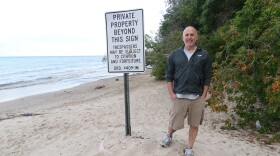When the U.S. housing bubble burst in 2008, the country was launched into the most severe recession since the Great Depression. For many families, this meant the loss of the family home.
Between 2006 and 2014, around 9 million American families lost homes due to foreclosure. There have been many studies on the ways foreclosure impacts someone's personal and professional life, but a recent study analyzed its impact on someone's political life.
The report looks at how foreclosures impacted voting patterns in 2012; the election during the height of the crisis. Paru Shah and Amber Wichowsky are the researchers behind the report. Shah is an associate professor of political science at UW-Milwaukee and Wichowsky is an associate professor of political science at Marquette University.
"In political science, there's overwhelming evidence that resources matter. So, resource-rich individuals are more likely to vote than resource-poor ones," Wichowsky says.
She continues, "If you think about foreclosure, that can be a huge shock to your household finances, but we also know that foreclosure can pay a psychological toll, as well. There's research that has looked at the effects of foreclosure on marital discord, on physical health and well-being, depression. These sorts of things can also be correlates of political participation."






